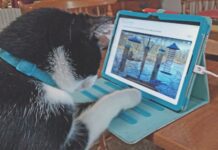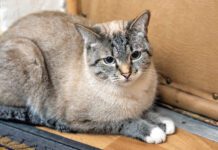Question: My two-year-old cat always gets carsick no matter how short the trip. Is there anything I can do to prevent this from happening? Also, I feed my cat only dry food, which I have read is better than wet food. Is it recommended to have dry food available at all times, or should I put my cat on a feeding schedule?
Answer: Cats may become ill during travel for several reasons. The first and simplest reason may be motion sickness. Some cats appear to be very sensitive to the movement of a vehicle. These cats may appear calm or even eager to enter the carrier, perhaps in anticipation of spending time with the family. After a short period of driving, motion sensitive cats may become nauseous. Often, they will begin to salivate and/or vomit.
Before long, the intelligent feline will have made the association between entering the car and feeling ill. Once the association is formed, the cat may vomit even before the vehicle begins to move. Thus, it is important to identify and treat a cats motion sickness as soon as it is identified.
If your cat is otherwise healthy, try to determine whether she is less likely to become ill if you withhold food for eight hours prior to travel, rather than feeding her as usual. You may also experiment to learn whether your cat is more comfortable with a slightly larger or slightly smaller carrier than the one you now use. Try a familiar washable mat for comfort. Finally, there are medications that your veterinarian may prescribe to help relieve motion sickness.
Fear and anxiety
Some cats are fearful by nature and they tend to become frightened whenever they are exposed to new sights, scents, or sounds. Needless to say, all of these senses are likely to be stimulated on any given journey in the car. As such, for the fearful cat, each trip might elicit one or more of the physical signs of anxiety. These signs may include salivation, vomiting, urination, and defecation.
Other cats may have generally calm temperaments yet become quite frightened when they need to visit the veterinarian or groomer. Although there are many ways to decrease stress during a trip to the veterinary hospital, there will be some aspects of the visit that you may not be able to control. For instance, your cat may become frightened upon spying that large dog in the parking lot or by the scent of pheromones of other patients.
Cats are often the stay-at-home members of the family. I expect that most cats are not brought along for short visits to friends or relatives, nor do most cats accompany the family on vacation trips. So, the intelligent cat can conclude that when she is placed in the carrier, a visit to the veterinarian is likely.
Systematic desensitization
Whether fearful by nature or by experience, cats that suffer carsickness because of an underlying fear may be treated through a systematic desensitization program. First, try to find a food that your cat particularly enjoys. Each day, place your cat in her carrier and feed a small amount of the special food. Once she is eagerly eating while closed in her carrier, bring her to the car and present her with food while she is in the stationary car. The next step should begin once your cat readily accepts the meal in the car. Place her in the carrier, bring her to the car, drive a short distance, and then feed her. When she has finished eating, return home. Continue this program, gradually increasing the length of the trip. Each trip should end in a comfortable place, be it your home or the home of a friend. In any case, she should be released from the carrier for some special activity, such as playing with a favorite toy.
Once your cat no longer becomes car sick, try to plan special trips every week or two. These may be short trips for meals, or just a drive around the block. These routine outings should allow your cat to maintain a relaxed demeanor while traveling in the car and to help minimize the association of the car with any unpleasant experience.
If your cat does not continue to improve, then consult with your veterinarian or a veterinary behaviorist. A more detailed behavior modification program can be designed for your cat. Your veterinarian may also be able to counsel you regarding the appropriate use of medication that might reduce her anxiety during travel.
The ideal diet
There is much controversy about what constitutes an ideal diet for a cat. There are many commercially available diets that are excellent. Some cats have special dietary needs due to ongoing medical conditions or because they are at risk of developing a medical condition. In general, healthy cats may benefit from eating both a good quality canned food and dry food.
Most cats seem to prefer to nibble throughout the day rather than to eat a full meal in one or two sittings. Of course, this may not always be possible. For instance, some cats are prone to obesity when free-fed. This tendency may be reduced by feeding one of the diets designed for less active cats.
On the other hand, some cats appear to become irritable or anxious when denied access to food. Although these cats may be maintained at an appropriate weight through dietary management, they may exhibit behaviors that reflect their underlying anxiety.
In short, the physical and psychological well being of your cat should be managed. She should be kept at her ideal weight through a combination of appropriate quantity and type of food and adequate exercise.



